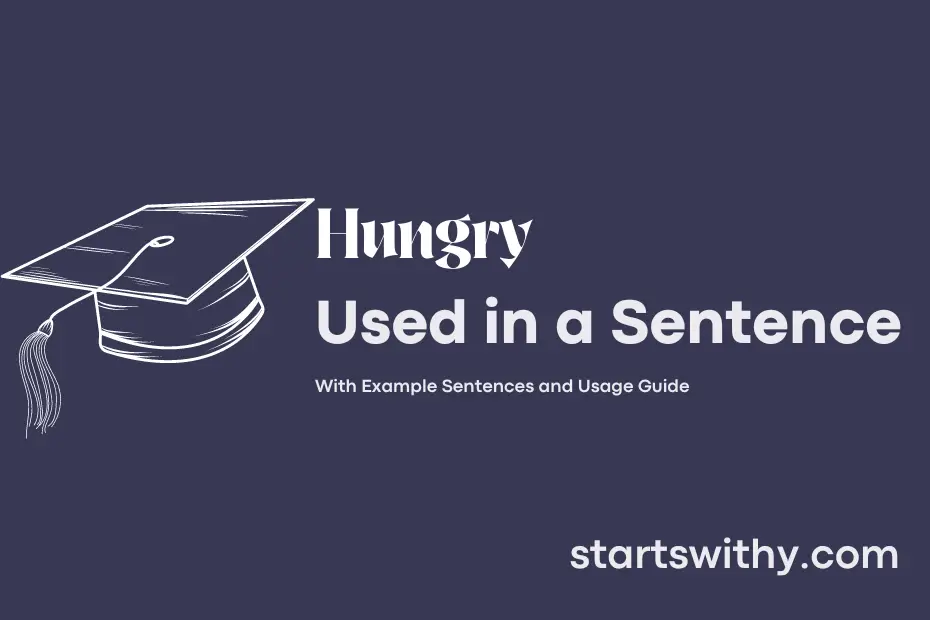Have you ever struggled to concentrate or felt irritable because your stomach was growling? This is a common sign that you are hungry, which simply means your body is signaling a need for food.
When you are hungry, your body is low on energy reserves and needs nourishment to function optimally. Ignoring hunger signals can lead to a drop in blood sugar levels, affecting your mood and cognitive abilities. It’s important to listen to your body and provide it with the fuel it needs to keep you feeling satisfied and focused throughout the day.
7 Examples Of Hungry Used In a Sentence For Kids
- I am hungry for a delicious snack.
- My tummy is hungry and wants some food.
- Let’s eat together when we feel hungry.
- I feel hungry after playing for so long.
- Mommy, I’m hungry and want something to eat.
- Don’t forget to have breakfast when you’re hungry.
- Hungry caterpillar wants to eat lots of food.

14 Sentences with Hungry Examples
- Hungry after a long lecture, I decided to grab a quick snack from the college canteen.
- When the cafeteria line was too long, I resorted to ordering a pizza online because I was hungry and impatient.
- Dealing with a strict budget, I always carried homemade snacks in my bag in case I got hungry during classes.
- After a tiring day of exams, my friends and I were all hungry for a hearty meal at our favorite restaurant.
- During late-night study sessions, my classmates and I would often order takeout when we felt hungry.
- Struggling to concentrate during lectures, the rumbling of my stomach made it clear that I was hungry.
- Balancing assignments and extracurricular activities, I sometimes forgot to eat properly and ended up feeling hungry late at night.
- When my roommates and I ran out of groceries, we resorted to raiding the pantry because we were all feeling hungry.
- To save time in the morning, I would often skip breakfast and end up feeling hungry before it was even lunchtime.
- Trying to stick to a healthy diet, I always kept fruits and nuts on hand for when I felt hungry between meals.
- Waking up late for class, I rushed out the door feeling hungry and regretting not having breakfast.
- Feeling hungry during a lecture, I discreetly snuck a granola bar out of my bag to munch on.
- Unwinding with friends after a long day, we would often end up at a nearby food stall, all feeling hungry and craving street food.
- Attending a college event that lasted all day, I made sure to pack a lunchbox to avoid feeling hungry while participating in activities.

How To Use Hungry in Sentences?
Hungry means feeling a strong desire or craving for food. To use hungry in a sentence, start by identifying the subject and verb. Then insert hungry to describe the subject’s feeling.
Example sentence:
– “She was hungry after skipping breakfast.”
In this sentence, “She” is the subject, “was” is the verb, and “hungry” describes how she felt.
To create your own sentence with hungry, follow these steps:
1. Identify the subject (who or what the sentence is about).
2. Identify the verb (action or state of being).
3. Insert hungry before or after the verb to show the subject’s craving for food.

Here are some other example sentences:
– “The dog looked hungry as it stared at the table.”
– “I always get hungry when I smell freshly baked cookies.”
– “After a long hike, we were all hungry for a hearty meal.”
Practice using hungry in different sentences to become more comfortable incorporating it into your everyday language. Remember, you can use hungry with various subjects and verbs to describe different situations or feelings related to food cravings.
Conclusion
In conclusion, our sentences with “hungry” have demonstrated the common usage of this word in various contexts. The examples have shown how being hungry can be a simple desire for food or a metaphorical hunger for success, knowledge, or opportunity. From “She was so hungry that she devoured the entire pizza” to “His hunger for success drove him to work tirelessly,” the word “hungry” can convey a range of meanings beyond just physical appetite.
By exploring these sentences, we can appreciate the versatility of “hungry” in capturing both the literal and figurative aspects of human experiences. It highlights the universal nature of hunger, whether it be for sustenance, achievement, or fulfillment, making it a relatable and powerful word in our everyday language.



